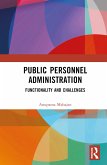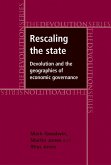The Routledge Handbook on Crisis, Polycrisis, and Public Administration
Herausgeber: Jeong, Bok Gyo; Thornton, Tonya E.; Sanabria-Pulido, Pablo; Moloney, Kim; Billingsley, Gloria J.; Zeemering, Eric
The Routledge Handbook on Crisis, Polycrisis, and Public Administration
Herausgeber: Jeong, Bok Gyo; Thornton, Tonya E.; Sanabria-Pulido, Pablo; Moloney, Kim; Billingsley, Gloria J.; Zeemering, Eric
- Gebundenes Buch
- Merkliste
- Auf die Merkliste
- Bewerten Bewerten
- Teilen
- Produkt teilen
- Produkterinnerung
- Produkterinnerung
This volume considers how local, national, and global crises with differing durations, sizes, and impacts challenge the public sector to respond. It gathers experts from different fields to explore how each crisis challenges human capacity, information technology, and communication capabilities, and how public leaders must respond.
Andere Kunden interessierten sich auch für
![The Human Side of Disaster The Human Side of Disaster]() Thomas E DrabekThe Human Side of Disaster161,99 €
Thomas E DrabekThe Human Side of Disaster161,99 €![Public Personnel Administration Public Personnel Administration]() Anupama Puri MahajanPublic Personnel Administration196,99 €
Anupama Puri MahajanPublic Personnel Administration196,99 €![Engaged Learning in the Public Service Classroom Engaged Learning in the Public Service Classroom]() Engaged Learning in the Public Service Classroom198,99 €
Engaged Learning in the Public Service Classroom198,99 €![The Craft of Teaching in Public Affairs The Craft of Teaching in Public Affairs]() The Craft of Teaching in Public Affairs200,99 €
The Craft of Teaching in Public Affairs200,99 €![Marriage and Values in Public Policy Marriage and Values in Public Policy]() Elizabeth van AckerMarriage and Values in Public Policy206,99 €
Elizabeth van AckerMarriage and Values in Public Policy206,99 €![Rescaling the State CB Rescaling the State CB]() Mark GoodwinRescaling the State CB149,99 €
Mark GoodwinRescaling the State CB149,99 €![Global Equity in Administration Global Equity in Administration]() Global Equity in Administration163,99 €
Global Equity in Administration163,99 €-
-
-
This volume considers how local, national, and global crises with differing durations, sizes, and impacts challenge the public sector to respond. It gathers experts from different fields to explore how each crisis challenges human capacity, information technology, and communication capabilities, and how public leaders must respond.
Hinweis: Dieser Artikel kann nur an eine deutsche Lieferadresse ausgeliefert werden.
Hinweis: Dieser Artikel kann nur an eine deutsche Lieferadresse ausgeliefert werden.
Produktdetails
- Produktdetails
- Verlag: Taylor & Francis Ltd
- Seitenzahl: 362
- Erscheinungstermin: 18. März 2025
- Englisch
- Abmessung: 254mm x 178mm
- Gewicht: 880g
- ISBN-13: 9781032367583
- ISBN-10: 103236758X
- Artikelnr.: 71620114
- Herstellerkennzeichnung
- Libri GmbH
- Europaallee 1
- 36244 Bad Hersfeld
- gpsr@libri.de
- Verlag: Taylor & Francis Ltd
- Seitenzahl: 362
- Erscheinungstermin: 18. März 2025
- Englisch
- Abmessung: 254mm x 178mm
- Gewicht: 880g
- ISBN-13: 9781032367583
- ISBN-10: 103236758X
- Artikelnr.: 71620114
- Herstellerkennzeichnung
- Libri GmbH
- Europaallee 1
- 36244 Bad Hersfeld
- gpsr@libri.de
Kim Moloney is an Associate Professor at the College of Public Policy at Hamad Bin Khalifa University, Qatar. Her latest books are her sole-authored Who Matters at the World Bank (2022) and separately, her co-editing (with Diane Stone) of The Oxford Handbook of Global Policy and Transnational Administration (2019). Gloria J. Billingsley is a Professor of Public Policy and Administration at Jackson State University, USA, with over 20 years of teaching experience and building community partnerships. Research includes issues on voting rights; race, gender, and class; minority participation in health research, and issues of spirituality and health. Bok Gyo Jeong is an Associate Professor of Public Affairs at Kean University, USA. His research interests include comparative civil society, global/transnational policy issues, nonprofit higher education, social entrepreneurship/economy, UN-NGO partnership, and collaboration between government and nonprofits. Pablo Sanabria-Pulido is a Professor at Universidad EAFIT, Colombia. He studies and teaches the design, formulation, and implementation of public policies and the managerial challenges that public service organizations and public officials face, aiming to disentangle how to make public organizations work better, particularly at the national and local levels. His research has been recognized and published in key international public administration and policy outlets. Tonya E. Thornton is the Director of Critical Infrastructure Protection with the Global Connective Center. Her expertise focuses on emergency management and grid security to provide resiliency solutions. She is a member of the American Society for Public Administration and is Treasurer for its Section on Emergency and Crisis Management. Eric Zeemering is an Associate Professor and MPA Director at the University of Georgia, USA.
AN INTRODUCTION 1. New Realities: Constancy of Crisis and Poly-Crisis for Public Administration Kim Moloney, Bok Gyo Jeong, and Pablo SanabriäPulido SECTION I - STRUCTURES IN CRISIS: A NORTH-SOUTH DIALOGUE Co
Editors: Pablo SanabriäPulido and Kim Moloney 2. How Citizens' Perceptions of Management Capacity and Trust in Government Change during a Worldwide Crisis? The Case of Colombia during the COVID
19 Pandemic Nathalie Méndez and Pablo SanabriäPulido 3. Crisis Management, Transnational Administration, and Administrative Sovereignty in Developing Countries: Problems of a National Disaster and Management Organization in Ghana Frank L. K. Ohemeng and Rosina K. Foli 4. The Performance of Local Government in Addressing Disaster Risk and Climate Change: a Comparative Analysis of Brazil, Mexico, and Paraguay Eduardo Grin, Ady Carrera, and Andrew Nickson 5. The Role of INTERPOL Coordinating a Global Public Policy in the Context of Unequal National Public Administration Capacities: A Case Study of the Transnational Administration Efforts to Face COVID-19 Crimes as Emerging Threats Gerardo BonilläAlguera 6. State Capacity to Address Dual Crises: the Negative Interaction between the COVID
19 Pandemic and Violence against Women in Argentina and Mexico Mariana Chudnovsky and Diana Martínez 7. Navigating Crisis and Fragmegration in the Public Sector: A Heterarchical Approach DanäMarie Ramjit SECTION II -- AGENTS IN CRISIS: A CROSS-ACTOR DIALOGUE Co
Editors: Bok Gyo Jeong and Kim Moloney 8. Sendai Framework for Disaster Risk Reduction, Transnational Crisis Management System, and the United Nations: Following the 2015 Nepal Earthquake Jungwon Yeo and Bok Gyo Jeong 9. Nongovernmental Organizations in Africa as Agenda in Crisis Response: The Case of Ghana James K. Agbodzakey and Sandra Schrouder 10. Public Policy and Flash Floods: Crisis Management in Selected Indian Ocean Islands Harshana Kasseeah and Sheetal Sheena Sookrajowa 11. Local Government Strategy and Crisis in the United States: A Community Resilience / Systems Perspective Brian D. Williams SECTION III - HUMAN CAPITAL AND INFORMATION TECHNOLOGY IN CRISIS Co
Editors: Eric Zeemering and Tonya E. Thornton 12. Intersecting Crises in Local Government Employment in the United States: COVID-19, the Grey Tsunami, and Workforce Evolution Kimberly L. Nelson and Brad A. M. Johnson 13. Roles of Nonprofit Organizations during the Emergency and Extreme Events: The Case of Continuum of Care (CoC) Homeless Serving Nonprofit Organizations during the COVID-19 Pandemic Simon A. Andrew, Hee Soun Jang, Vaswati Chatterjee, and Sara Ford 14. Technology and Crisis: Butterfly or Domino Effect in Governing a Turbulent World? Veronica Junjan, Islam Bouzguenda, and Caroline Fischer 15. Training Citizen Responses during a Crisis via Innovative ICT-based Administrative Actions in South Korea Shin Kue Ryu 16. Critical Success Factors for Government Crisis Communication over Social Media in Emergency Management Nilay Yavuz, Naci Karkin, and Mete Yildiz SECTION IV - PUBLIC SECTOR COMMUNICATION IN CRISIS Co
Editors: Gloria J. Billingsley and Tonya E. Thornton 17. Public Sector Communication in Federal Systems of Government: Exploring Successes and Failures in Crisis Communication Saahir Shafi and Daniel J. Mallinson 18. Information Capacity and the Implementation of Social Programs in Latin America Rik Peeters, Guillermo M. Cejudo, and César Rentería 19. COVID-19 Vaccine Hesitancy and Public Trust in Government: Implications for the Locus of Public Administration in South Africa Nqobile Sikhosana and Ogochukwu Nzewi 20. Legitimacy deficit during emergencies: The impact of administrative discretion Héctor David Rojas Villamil and Juan Carlos Covilla Martínez 21. Network Governance for Coordinated Disaster Response Ratna B. Dougherty and Naim Kapucu 22. Diffusion in times of Political Polarization: An Analysis of Face Mask Policy Adoption in the United States Davia C. Downey and William M. Myers 23. Impacts of Pandemic Planning Preparedness on select U.S. Cities during COVID-19 Karissa D. Bergene SECTION V - PRACTITIONERS IN CRISIS Co
Editors: Kim Moloney, Gloria J. Billingsley, Bok Gyo Jeong, Pablo SanabriäPulido, Tonya E. Thornton, and Eric Zeemering 24. COVID-19 and the Non-Profit Dimension: The ASPA Experience William Shields, Jr. 25. Population Decrease and Local Government's Measure: Lessons from Japanese Prefecture's Experiences Kazuyuki Ishida 26. Religion, Crisis, and Public Policy Gloria J. Billingsley 27. Understanding the Impacts and Associated Lessons of Turnover for Emergency Management and Public Health Leaders in North Carolina during the COVID-19 Pandemic Hardin Watkins 28. Fulfilling a volunteer-driven mission in the era of social distancing Leslie Hale 29. Using Communication Science to Inform Responsible Crisis Communication Holli H. Seitz IN CONCLUSION 30. Conclusion Eric Zeemering, Gloria J. Billingsley, and Tonya E. Thornton
Editors: Pablo SanabriäPulido and Kim Moloney 2. How Citizens' Perceptions of Management Capacity and Trust in Government Change during a Worldwide Crisis? The Case of Colombia during the COVID
19 Pandemic Nathalie Méndez and Pablo SanabriäPulido 3. Crisis Management, Transnational Administration, and Administrative Sovereignty in Developing Countries: Problems of a National Disaster and Management Organization in Ghana Frank L. K. Ohemeng and Rosina K. Foli 4. The Performance of Local Government in Addressing Disaster Risk and Climate Change: a Comparative Analysis of Brazil, Mexico, and Paraguay Eduardo Grin, Ady Carrera, and Andrew Nickson 5. The Role of INTERPOL Coordinating a Global Public Policy in the Context of Unequal National Public Administration Capacities: A Case Study of the Transnational Administration Efforts to Face COVID-19 Crimes as Emerging Threats Gerardo BonilläAlguera 6. State Capacity to Address Dual Crises: the Negative Interaction between the COVID
19 Pandemic and Violence against Women in Argentina and Mexico Mariana Chudnovsky and Diana Martínez 7. Navigating Crisis and Fragmegration in the Public Sector: A Heterarchical Approach DanäMarie Ramjit SECTION II -- AGENTS IN CRISIS: A CROSS-ACTOR DIALOGUE Co
Editors: Bok Gyo Jeong and Kim Moloney 8. Sendai Framework for Disaster Risk Reduction, Transnational Crisis Management System, and the United Nations: Following the 2015 Nepal Earthquake Jungwon Yeo and Bok Gyo Jeong 9. Nongovernmental Organizations in Africa as Agenda in Crisis Response: The Case of Ghana James K. Agbodzakey and Sandra Schrouder 10. Public Policy and Flash Floods: Crisis Management in Selected Indian Ocean Islands Harshana Kasseeah and Sheetal Sheena Sookrajowa 11. Local Government Strategy and Crisis in the United States: A Community Resilience / Systems Perspective Brian D. Williams SECTION III - HUMAN CAPITAL AND INFORMATION TECHNOLOGY IN CRISIS Co
Editors: Eric Zeemering and Tonya E. Thornton 12. Intersecting Crises in Local Government Employment in the United States: COVID-19, the Grey Tsunami, and Workforce Evolution Kimberly L. Nelson and Brad A. M. Johnson 13. Roles of Nonprofit Organizations during the Emergency and Extreme Events: The Case of Continuum of Care (CoC) Homeless Serving Nonprofit Organizations during the COVID-19 Pandemic Simon A. Andrew, Hee Soun Jang, Vaswati Chatterjee, and Sara Ford 14. Technology and Crisis: Butterfly or Domino Effect in Governing a Turbulent World? Veronica Junjan, Islam Bouzguenda, and Caroline Fischer 15. Training Citizen Responses during a Crisis via Innovative ICT-based Administrative Actions in South Korea Shin Kue Ryu 16. Critical Success Factors for Government Crisis Communication over Social Media in Emergency Management Nilay Yavuz, Naci Karkin, and Mete Yildiz SECTION IV - PUBLIC SECTOR COMMUNICATION IN CRISIS Co
Editors: Gloria J. Billingsley and Tonya E. Thornton 17. Public Sector Communication in Federal Systems of Government: Exploring Successes and Failures in Crisis Communication Saahir Shafi and Daniel J. Mallinson 18. Information Capacity and the Implementation of Social Programs in Latin America Rik Peeters, Guillermo M. Cejudo, and César Rentería 19. COVID-19 Vaccine Hesitancy and Public Trust in Government: Implications for the Locus of Public Administration in South Africa Nqobile Sikhosana and Ogochukwu Nzewi 20. Legitimacy deficit during emergencies: The impact of administrative discretion Héctor David Rojas Villamil and Juan Carlos Covilla Martínez 21. Network Governance for Coordinated Disaster Response Ratna B. Dougherty and Naim Kapucu 22. Diffusion in times of Political Polarization: An Analysis of Face Mask Policy Adoption in the United States Davia C. Downey and William M. Myers 23. Impacts of Pandemic Planning Preparedness on select U.S. Cities during COVID-19 Karissa D. Bergene SECTION V - PRACTITIONERS IN CRISIS Co
Editors: Kim Moloney, Gloria J. Billingsley, Bok Gyo Jeong, Pablo SanabriäPulido, Tonya E. Thornton, and Eric Zeemering 24. COVID-19 and the Non-Profit Dimension: The ASPA Experience William Shields, Jr. 25. Population Decrease and Local Government's Measure: Lessons from Japanese Prefecture's Experiences Kazuyuki Ishida 26. Religion, Crisis, and Public Policy Gloria J. Billingsley 27. Understanding the Impacts and Associated Lessons of Turnover for Emergency Management and Public Health Leaders in North Carolina during the COVID-19 Pandemic Hardin Watkins 28. Fulfilling a volunteer-driven mission in the era of social distancing Leslie Hale 29. Using Communication Science to Inform Responsible Crisis Communication Holli H. Seitz IN CONCLUSION 30. Conclusion Eric Zeemering, Gloria J. Billingsley, and Tonya E. Thornton
AN INTRODUCTION 1. New Realities: Constancy of Crisis and Poly-Crisis for Public Administration Kim Moloney, Bok Gyo Jeong, and Pablo SanabriäPulido SECTION I - STRUCTURES IN CRISIS: A NORTH-SOUTH DIALOGUE Co
Editors: Pablo SanabriäPulido and Kim Moloney 2. How Citizens' Perceptions of Management Capacity and Trust in Government Change during a Worldwide Crisis? The Case of Colombia during the COVID
19 Pandemic Nathalie Méndez and Pablo SanabriäPulido 3. Crisis Management, Transnational Administration, and Administrative Sovereignty in Developing Countries: Problems of a National Disaster and Management Organization in Ghana Frank L. K. Ohemeng and Rosina K. Foli 4. The Performance of Local Government in Addressing Disaster Risk and Climate Change: a Comparative Analysis of Brazil, Mexico, and Paraguay Eduardo Grin, Ady Carrera, and Andrew Nickson 5. The Role of INTERPOL Coordinating a Global Public Policy in the Context of Unequal National Public Administration Capacities: A Case Study of the Transnational Administration Efforts to Face COVID-19 Crimes as Emerging Threats Gerardo BonilläAlguera 6. State Capacity to Address Dual Crises: the Negative Interaction between the COVID
19 Pandemic and Violence against Women in Argentina and Mexico Mariana Chudnovsky and Diana Martínez 7. Navigating Crisis and Fragmegration in the Public Sector: A Heterarchical Approach DanäMarie Ramjit SECTION II -- AGENTS IN CRISIS: A CROSS-ACTOR DIALOGUE Co
Editors: Bok Gyo Jeong and Kim Moloney 8. Sendai Framework for Disaster Risk Reduction, Transnational Crisis Management System, and the United Nations: Following the 2015 Nepal Earthquake Jungwon Yeo and Bok Gyo Jeong 9. Nongovernmental Organizations in Africa as Agenda in Crisis Response: The Case of Ghana James K. Agbodzakey and Sandra Schrouder 10. Public Policy and Flash Floods: Crisis Management in Selected Indian Ocean Islands Harshana Kasseeah and Sheetal Sheena Sookrajowa 11. Local Government Strategy and Crisis in the United States: A Community Resilience / Systems Perspective Brian D. Williams SECTION III - HUMAN CAPITAL AND INFORMATION TECHNOLOGY IN CRISIS Co
Editors: Eric Zeemering and Tonya E. Thornton 12. Intersecting Crises in Local Government Employment in the United States: COVID-19, the Grey Tsunami, and Workforce Evolution Kimberly L. Nelson and Brad A. M. Johnson 13. Roles of Nonprofit Organizations during the Emergency and Extreme Events: The Case of Continuum of Care (CoC) Homeless Serving Nonprofit Organizations during the COVID-19 Pandemic Simon A. Andrew, Hee Soun Jang, Vaswati Chatterjee, and Sara Ford 14. Technology and Crisis: Butterfly or Domino Effect in Governing a Turbulent World? Veronica Junjan, Islam Bouzguenda, and Caroline Fischer 15. Training Citizen Responses during a Crisis via Innovative ICT-based Administrative Actions in South Korea Shin Kue Ryu 16. Critical Success Factors for Government Crisis Communication over Social Media in Emergency Management Nilay Yavuz, Naci Karkin, and Mete Yildiz SECTION IV - PUBLIC SECTOR COMMUNICATION IN CRISIS Co
Editors: Gloria J. Billingsley and Tonya E. Thornton 17. Public Sector Communication in Federal Systems of Government: Exploring Successes and Failures in Crisis Communication Saahir Shafi and Daniel J. Mallinson 18. Information Capacity and the Implementation of Social Programs in Latin America Rik Peeters, Guillermo M. Cejudo, and César Rentería 19. COVID-19 Vaccine Hesitancy and Public Trust in Government: Implications for the Locus of Public Administration in South Africa Nqobile Sikhosana and Ogochukwu Nzewi 20. Legitimacy deficit during emergencies: The impact of administrative discretion Héctor David Rojas Villamil and Juan Carlos Covilla Martínez 21. Network Governance for Coordinated Disaster Response Ratna B. Dougherty and Naim Kapucu 22. Diffusion in times of Political Polarization: An Analysis of Face Mask Policy Adoption in the United States Davia C. Downey and William M. Myers 23. Impacts of Pandemic Planning Preparedness on select U.S. Cities during COVID-19 Karissa D. Bergene SECTION V - PRACTITIONERS IN CRISIS Co
Editors: Kim Moloney, Gloria J. Billingsley, Bok Gyo Jeong, Pablo SanabriäPulido, Tonya E. Thornton, and Eric Zeemering 24. COVID-19 and the Non-Profit Dimension: The ASPA Experience William Shields, Jr. 25. Population Decrease and Local Government's Measure: Lessons from Japanese Prefecture's Experiences Kazuyuki Ishida 26. Religion, Crisis, and Public Policy Gloria J. Billingsley 27. Understanding the Impacts and Associated Lessons of Turnover for Emergency Management and Public Health Leaders in North Carolina during the COVID-19 Pandemic Hardin Watkins 28. Fulfilling a volunteer-driven mission in the era of social distancing Leslie Hale 29. Using Communication Science to Inform Responsible Crisis Communication Holli H. Seitz IN CONCLUSION 30. Conclusion Eric Zeemering, Gloria J. Billingsley, and Tonya E. Thornton
Editors: Pablo SanabriäPulido and Kim Moloney 2. How Citizens' Perceptions of Management Capacity and Trust in Government Change during a Worldwide Crisis? The Case of Colombia during the COVID
19 Pandemic Nathalie Méndez and Pablo SanabriäPulido 3. Crisis Management, Transnational Administration, and Administrative Sovereignty in Developing Countries: Problems of a National Disaster and Management Organization in Ghana Frank L. K. Ohemeng and Rosina K. Foli 4. The Performance of Local Government in Addressing Disaster Risk and Climate Change: a Comparative Analysis of Brazil, Mexico, and Paraguay Eduardo Grin, Ady Carrera, and Andrew Nickson 5. The Role of INTERPOL Coordinating a Global Public Policy in the Context of Unequal National Public Administration Capacities: A Case Study of the Transnational Administration Efforts to Face COVID-19 Crimes as Emerging Threats Gerardo BonilläAlguera 6. State Capacity to Address Dual Crises: the Negative Interaction between the COVID
19 Pandemic and Violence against Women in Argentina and Mexico Mariana Chudnovsky and Diana Martínez 7. Navigating Crisis and Fragmegration in the Public Sector: A Heterarchical Approach DanäMarie Ramjit SECTION II -- AGENTS IN CRISIS: A CROSS-ACTOR DIALOGUE Co
Editors: Bok Gyo Jeong and Kim Moloney 8. Sendai Framework for Disaster Risk Reduction, Transnational Crisis Management System, and the United Nations: Following the 2015 Nepal Earthquake Jungwon Yeo and Bok Gyo Jeong 9. Nongovernmental Organizations in Africa as Agenda in Crisis Response: The Case of Ghana James K. Agbodzakey and Sandra Schrouder 10. Public Policy and Flash Floods: Crisis Management in Selected Indian Ocean Islands Harshana Kasseeah and Sheetal Sheena Sookrajowa 11. Local Government Strategy and Crisis in the United States: A Community Resilience / Systems Perspective Brian D. Williams SECTION III - HUMAN CAPITAL AND INFORMATION TECHNOLOGY IN CRISIS Co
Editors: Eric Zeemering and Tonya E. Thornton 12. Intersecting Crises in Local Government Employment in the United States: COVID-19, the Grey Tsunami, and Workforce Evolution Kimberly L. Nelson and Brad A. M. Johnson 13. Roles of Nonprofit Organizations during the Emergency and Extreme Events: The Case of Continuum of Care (CoC) Homeless Serving Nonprofit Organizations during the COVID-19 Pandemic Simon A. Andrew, Hee Soun Jang, Vaswati Chatterjee, and Sara Ford 14. Technology and Crisis: Butterfly or Domino Effect in Governing a Turbulent World? Veronica Junjan, Islam Bouzguenda, and Caroline Fischer 15. Training Citizen Responses during a Crisis via Innovative ICT-based Administrative Actions in South Korea Shin Kue Ryu 16. Critical Success Factors for Government Crisis Communication over Social Media in Emergency Management Nilay Yavuz, Naci Karkin, and Mete Yildiz SECTION IV - PUBLIC SECTOR COMMUNICATION IN CRISIS Co
Editors: Gloria J. Billingsley and Tonya E. Thornton 17. Public Sector Communication in Federal Systems of Government: Exploring Successes and Failures in Crisis Communication Saahir Shafi and Daniel J. Mallinson 18. Information Capacity and the Implementation of Social Programs in Latin America Rik Peeters, Guillermo M. Cejudo, and César Rentería 19. COVID-19 Vaccine Hesitancy and Public Trust in Government: Implications for the Locus of Public Administration in South Africa Nqobile Sikhosana and Ogochukwu Nzewi 20. Legitimacy deficit during emergencies: The impact of administrative discretion Héctor David Rojas Villamil and Juan Carlos Covilla Martínez 21. Network Governance for Coordinated Disaster Response Ratna B. Dougherty and Naim Kapucu 22. Diffusion in times of Political Polarization: An Analysis of Face Mask Policy Adoption in the United States Davia C. Downey and William M. Myers 23. Impacts of Pandemic Planning Preparedness on select U.S. Cities during COVID-19 Karissa D. Bergene SECTION V - PRACTITIONERS IN CRISIS Co
Editors: Kim Moloney, Gloria J. Billingsley, Bok Gyo Jeong, Pablo SanabriäPulido, Tonya E. Thornton, and Eric Zeemering 24. COVID-19 and the Non-Profit Dimension: The ASPA Experience William Shields, Jr. 25. Population Decrease and Local Government's Measure: Lessons from Japanese Prefecture's Experiences Kazuyuki Ishida 26. Religion, Crisis, and Public Policy Gloria J. Billingsley 27. Understanding the Impacts and Associated Lessons of Turnover for Emergency Management and Public Health Leaders in North Carolina during the COVID-19 Pandemic Hardin Watkins 28. Fulfilling a volunteer-driven mission in the era of social distancing Leslie Hale 29. Using Communication Science to Inform Responsible Crisis Communication Holli H. Seitz IN CONCLUSION 30. Conclusion Eric Zeemering, Gloria J. Billingsley, and Tonya E. Thornton








